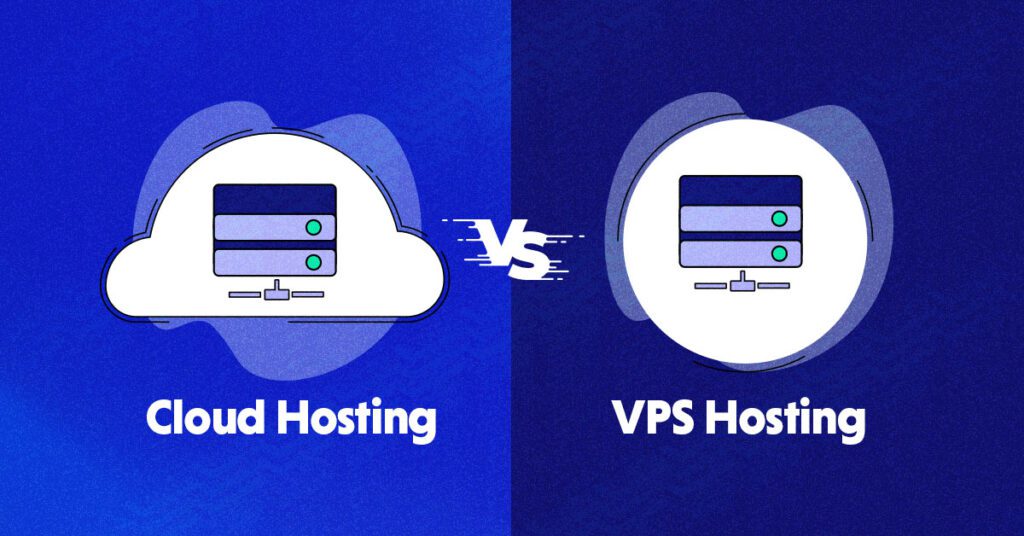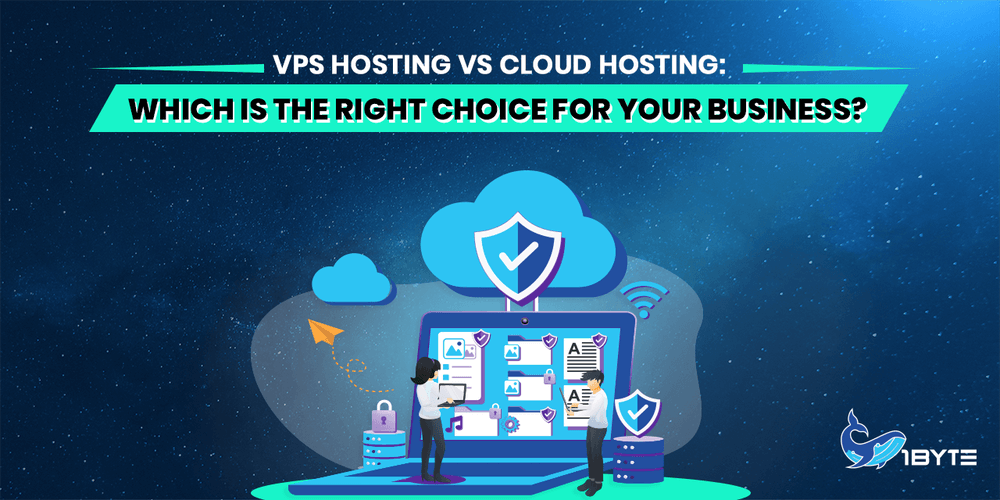When it comes to hosting your website, there are a lot of options available. Two of the most popular choices are VPS hosting and cloud hosting. While both types of hosting have their own advantages and disadvantages, it can be challenging to determine which one is the right fit for your business. In this article, we’ll explore the differences between VPS hosting vs cloud hosting, as well as their unique features, cost comparisons, scalability, performance, and security. By the end of this article, you’ll have a better understanding of which hosting option is the best fit for your business needs.
An Overview
Before diving into the specifics of VPS hosting vs cloud hosting, it’s essential to have a general understanding of what hosting entails.
Importance of Choosing the Right Hosting for Your Business
Choosing the right hosting solution is crucial for any business that wants to establish and maintain a strong online presence. Your website’s hosting can affect your website’s speed, uptime, and overall performance, which can directly impact your customers’ experience on your website. A slow or unreliable website can lead to frustrated visitors and lost sales.
Additionally, the hosting solution you choose can also affect your website’s security. If your hosting environment is not secure, it can leave your website vulnerable to hackers and malware attacks.
Therefore, it’s important to choose the right hosting solution that can provide the performance and security you need for your business. VPS hosting and cloud hosting are both great options, but they have their own advantages and disadvantages. By understanding these differences, you can choose the hosting solution that best fits your business’s needs and budget.
Why You Should Consider VPS Hosting vs Cloud Hosting
VPS hosting and cloud hosting both have their unique advantages, making them both great options for businesses looking to host their website.
One of the advantages of VPS hosting is that it provides a higher level of control and customization compared to shared hosting. With VPS hosting, you have access to your own dedicated resources, allowing you to install and run custom software applications. Additionally, VPS hosting is often more affordable than dedicated hosting, making it a great option for businesses looking for more control over their hosting environment without breaking the bank.

Cloud hosting, on the other hand, offers unparalleled scalability and reliability. With cloud hosting, your website is hosted on a network of servers, rather than a single physical server. This means that if one server goes down, your website can quickly and easily be switched to another server, ensuring maximum uptime and availability. Cloud hosting also allows you to easily scale up or down your hosting resources, making it a great option for businesses that experience fluctuating traffic levels.
In addition to their respective advantages, both VPS hosting and cloud hosting offer improved security compared to shared hosting. With VPS hosting, each account is isolated from other users on the same physical server, providing a more secure hosting environment. Cloud hosting, on the other hand, uses redundant servers to ensure maximum uptime and availability, which also provides an extra layer of security.
On VPS Hosting
VPS hosting is a type of web hosting that offers more control and flexibility compared to shared hosting. It provides users with a dedicated portion of a physical server, which they can customize and configure according to their needs. This section will delve deeper into the features and benefits of VPS hosting and explain why it might be the right choice for your business. Whether you are looking for more control over your hosting environment, better performance, or enhanced security, VPS hosting has a lot to offer. Let’s explore the world of VPS hosting and discover how it can help you take your website to the next level.
What is VPS Hosting?
VPS hosting stands for Virtual Private Server hosting, which means that a single physical server is divided into multiple virtual servers, each of which acts as an independent server with its own dedicated resources. Each virtual server is isolated from the others and has its own operating system, storage, and memory.
VPS hosting provides users with more control and customization options than shared hosting, where multiple websites share the same server resources. With VPS hosting, users can install and configure their preferred operating system, software, and applications, and have full root access to their virtual server.
Compared to shared hosting, VPS hosting offers better performance, scalability, and security. With VPS hosting, users don’t have to worry about other websites on the same server affecting their website’s performance. They can also upgrade their resources as their website grows and needs more resources.
Overall, VPS hosting is an excellent choice for businesses that need more control and flexibility over their hosting environment, and want to ensure better performance, security, and scalability for their website.
Advantages of VPS Hosting
VPS Hosting has several advantages over cloud hosting that are worth considering.
1. VPS hosting is generally more affordable than cloud hosting. This is because VPS hosting typically uses fewer resources, such as RAM and CPU, which makes it less expensive to operate.
2. VPS hosting allows for greater customization and control. With VPS hosting, users can customize their server settings and install software that is specific to their needs. This level of control is not typically possible with cloud hosting, which is more standardized.

3. VPS hosting provides better security than cloud hosting. This is because VPS hosting operates on a single physical server, which means that there is less risk of a security breach affecting multiple users. In contrast, cloud hosting often involves the sharing of resources across multiple servers, which can increase the risk of security vulnerabilities.
4. VPS hosting offers better performance than cloud hosting. This is because VPS hosting provides dedicated resources to each user, which ensures consistent performance. Cloud hosting, on the other hand, can suffer from performance issues if multiple users are competing for resources at the same time.
5. VPS hosting is easier to scale vs cloud hosting. With VPS hosting, users can easily upgrade or downgrade their server resources as needed. Cloud hosting can be more complicated to scale because it often involves the use of multiple servers.
Disadvantages of VPS Hosting
While VPS hosting has its advantages, it also has some disadvantages that should be considered when comparing it to cloud hosting.
1. VPS hosting requires more technical knowledge and expertise than cloud hosting. Users need to be familiar with server management and maintenance to ensure that their VPS is running smoothly. This can be a challenge for those who are not familiar with the technical aspects of hosting.
2. VPS hosting is less flexible than cloud hosting. With VPS hosting, users are limited to the resources that are allocated to their server. This means that if they need more resources, they may need to upgrade their VPS plan or migrate to a different hosting solution. In contrast, cloud hosting allows users to easily scale their resources up or down as needed.
3. VPS hosting can be less reliable than cloud hosting. This is because VPS hosting relies on a single physical server, which can be vulnerable to hardware failures or other issues that can impact the performance of the VPS. Cloud hosting, on the other hand, is designed to be highly redundant, with resources spread across multiple servers.
4. VPS hosting may not be suitable for high-traffic websites or applications. This is because VPS hosting provides dedicated resources to each user, which can limit the amount of traffic that a VPS can handle. In contrast, cloud hosting can easily handle high levels of traffic by distributing resources across multiple servers.
5. VPS hosting may have limited support compared to cloud hosting. Some VPS hosting providers may not offer the same level of technical support or customer service as cloud hosting providers, which can be a challenge for users who need assistance with their hosting.
On Cloud Hosting
Now that we have discussed VPS hosting and its features, let’s move on to cloud hosting. Cloud hosting is a relatively new technology that is gaining popularity due to its flexibility, scalability, and cost-effectiveness. In this section, we will discuss what cloud hosting is, its features, and why it may be the right choice for your business.
What is Cloud Hosting?
Cloud hosting is a type of hosting that utilizes a network of servers to store, manage, and process data. It is a highly scalable and flexible option that allows businesses to easily adjust their resources as needed. In a cloud hosting environment, multiple servers are interconnected and work together to provide resources and ensure high availability.
In contrast to traditional hosting options like shared or dedicated hosting, cloud hosting provides more reliable and consistent performance. With cloud hosting, you only pay for the resources that you use, allowing for cost-effective scalability. Cloud hosting is also highly secure, with many providers offering advanced security features like firewalls and DDoS protection.
One of the main benefits of cloud hosting is its scalability. You can easily increase or decrease your resources based on your business needs. This can be especially useful for businesses with fluctuating traffic or resource needs.
Another benefit of cloud hosting is its high availability. Since resources are distributed across multiple servers, if one server goes down, the others can pick up the slack. This ensures that your website or application remains available even if one server fails.
Overall, cloud hosting is an excellent option for businesses that require a highly scalable, flexible, and reliable hosting solution. It is ideal for businesses that experience high traffic or require consistent performance.
Advantages of Cloud Hosting
Cloud hosting has many advantages over VPS hosting, making it an increasingly popular choice for businesses of all sizes.
1. Cloud hosting offers unmatched flexibility. Users can easily add or remove resources as needed, without worrying about the limitations of a physical server. This can help businesses stay agile and responsive to changing needs and demands.
2. Cloud hosting provides high levels of reliability and uptime. With cloud hosting, resources are distributed across multiple servers, so if one server experiences an issue, traffic can be automatically rerouted to other servers. This helps to minimize downtime and ensure that websites and applications remain available to users.

3. Cloud hosting offers superior scalability. As businesses grow, they may need to increase their server resources to handle higher traffic volumes. With cloud hosting, this can be easily accomplished with a few clicks, without the need for additional hardware.
4. Cloud hosting can be highly cost-effective. With pay-as-you-go pricing models, businesses only pay for the resources they actually use, making cloud hosting more affordable than traditional hosting models.
5. Cloud hosting is highly secure. Cloud hosting providers typically offer a range of security measures, including firewalls, intrusion detection and prevention systems, and data encryption. These measures can help protect websites and applications from cyberattacks and other security threats.
6. Cloud hosting provides a range of advanced features, including load balancing, automatic backups, and disaster recovery. These features can help businesses improve their website and application performance and ensure that their data is secure and accessible.
Disadvantages of Cloud Hosting
While cloud hosting has many advantages, there are also some potential disadvantages that businesses should be aware of.
1. One potential disadvantage of cloud hosting is that it may require a higher level of technical expertise than traditional hosting models. This is because cloud hosting often involves more complex configurations and management of multiple servers and resources.
2. Another disadvantage is that cloud hosting can be more expensive than traditional hosting models for businesses with consistent and predictable traffic. While pay-as-you-go pricing can be cost-effective for businesses with fluctuating traffic volumes, businesses with consistent traffic may find that they are paying more for cloud hosting than they would for traditional hosting models.
3. A third potential disadvantage of cloud hosting is that it relies on an internet connection. If a business’s internet connection is slow or unreliable, it can negatively impact website and application performance, regardless of how many server resources are available.
4. Finally, there are some concerns about data privacy and security with cloud hosting. Businesses need to ensure that they are working with a reputable and trustworthy cloud hosting provider and that they are taking all necessary measures to protect their data.
So, Which is the Right Choice?
Choosing between VPS hosting and cloud hosting ultimately depends on your business needs and preferences.
VPS hosting may be a better option for businesses that require more control over their server and website, and have specific resource requirements. It is also a more affordable option for businesses on a tight budget, with prices starting as low as $5 per month.
On the other hand, cloud hosting is a more scalable and flexible option that can accommodate sudden surges in traffic and resource demands. It is also a more reliable option with better uptime rates and disaster recovery features.

If you are uncertain which option is best for your business, consider the following factors:
- Budget: VPS hosting is generally more affordable, but cloud hosting may be worth the investment if you require more scalability and reliability.
- Resource needs: If your business has specific resource requirements or needs more control over your server, VPS hosting may be the better option.
- Scalability: If your business requires the ability to scale quickly in response to traffic spikes or growth, cloud hosting may be the better option.
- Uptime and reliability: If your business cannot afford to experience downtime or data loss, cloud hosting may be the better option due to its better uptime rates and disaster recovery features.
Ultimately, the choice between VPS hosting and cloud hosting comes down to your specific business needs and preferences. It’s important to carefully consider your options and choose the one that best suits your requirements.
Conclusion
Both VPS hosting and cloud hosting have their unique features and drawbacks. The decision on which one to use ultimately depends on your business needs, budget, and technical expertise. However, it is essential to choose a reliable and reputable provider that can offer you the support and resources you need to run your website or application smoothly.
If you are looking for a trusted cloud provider, 1Byte is an excellent option. We offer a wide range of cloud solutions, including VPS and cloud hosting, and provide top-notch support and security to their clients. With our expertise and experience, you can be assured of a seamless and hassle-free hosting experience.

